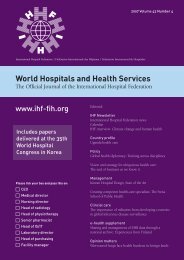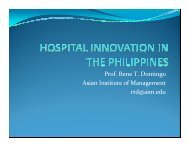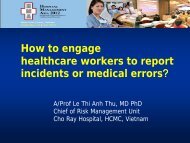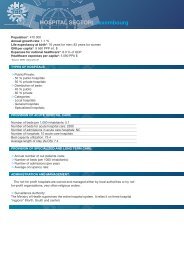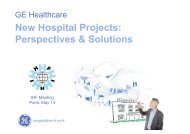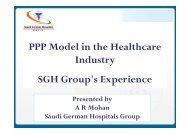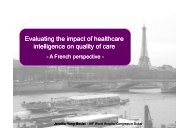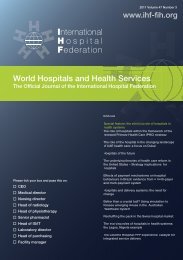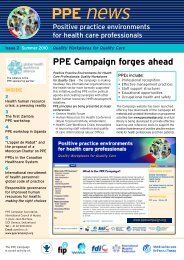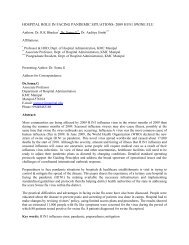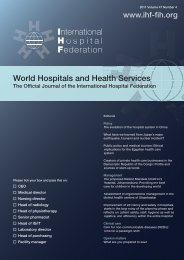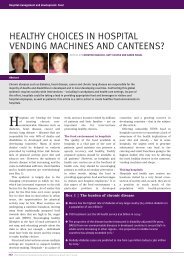Full document - International Hospital Federation
Full document - International Hospital Federation
Full document - International Hospital Federation
Create successful ePaper yourself
Turn your PDF publications into a flip-book with our unique Google optimized e-Paper software.
Innovation and stategy: Accelerating Access Initiative<br />
The Accelerating Access Initiative:<br />
experience with a multinational<br />
workplace programme in Africa<br />
ARTICLE BY S VAN DER BORGHT<br />
Heineken <strong>International</strong> Health Affairs, Amsterdam, Netherlands<br />
V JANSSENS<br />
PharmAccess Foundation, Amsterdam, Netherlands<br />
MF SCHIM VAN DER LOEFF<br />
GGD (Public health service), Amsterdam, Netherlands<br />
A KAJEMBA<br />
GGD (Public health service), Amsterdam, Netherlands<br />
H RIJCKBORST<br />
Heineken <strong>International</strong> Health Affairs, Amsterdam, Netherlands<br />
JMA LANGE<br />
PharmAccess Foundation, Amsterdam, Netherlands<br />
TF RINK DE WIT<br />
PharmAccess Foundation, Amsterdam, Netherlands<br />
Problem: A multinational company with operations in several African countries was committed to offer antiretroviral treatment<br />
to its employees and their dependants. Approach The Accelerating Access Initiative (AAI), an initiative of six pharmaceutical<br />
companies and five United Nations’ agencies, offered the possibility of obtaining brand antiretroviral drugs (ARVs) at 10% of<br />
the commercial price. PharmAccess, a foundation aimed at removing barriers to AIDS treatment in Africa, helped to establish<br />
an HIV policy and treatment guidelines, and a workplace programme was rolled out from September 2001.<br />
Local setting: Private sector employers in Africa are keen to take more responsibility in HIV prevention and AIDS care. An<br />
important hurdle for African employers remains the price and availability of ARVs.<br />
Relevant changes: The programme encountered various hurdles, among them the need for multiple contracts with multiple<br />
companies, complex importation procedures, taxes levied on ARVs, lack of support from pharmaceutical companies in<br />
importation and transportation, slow delivery of the drugs, lack of institutional memory in pharmaceutical companies and<br />
government policies excluding the company from access to ARVs under the AAI.<br />
Lessons learned: The launch of the AAI enabled this multinational company to offer access to ARVs to its employees and<br />
dependants. The private sector should have access to these discounted drugs under the AAI. A network of local AAI offices<br />
should be created to assist in logistics of drugs ordering, purchase and clearance. No taxes should be levied on ARVs.<br />
HIV is the largest threat to adult survival in sub-Saharan<br />
Africa. According to UNAIDS, 33 million people were living<br />
with HIV by December 2007, of whom 22 million were in<br />
sub-Saharan Africa. In 2007 an estimated 1.5 million sub- Saharan<br />
Africans died of AIDS and an estimated 1.9 million became<br />
infected with HIV. 1 Several international initiatives were launched to<br />
increase funding for antiretroviral therapy. This has led to a<br />
spectacular increase in access to antiretroviral drugs (ARVs) in<br />
Africa: by April 2007 an estimated 28% of eligible HIV patients in<br />
sub-Saharan Africa were on ARVs. 2 One initiative that aimed to<br />
increase access was the Accelerating Access Initiative (AAI). This<br />
paper reports practical experiences of a multinational company<br />
with the AAI.<br />
Approach<br />
In May 2000 five United Nations organizations – United Nations<br />
Population Fund (UNFPA), United Nations Children’s Fund<br />
(UNICEF), WHO, The World Bank and the Joint United Nations<br />
Programme on HIV/AIDS (UNAIDS) – announced a partnership<br />
with five pharmaceutical companies to address the lack of<br />
affordable HIV medicines in resourcepoor settings. 3 This<br />
partnership, the AAI, 4 was committed to offer ARVs at about 10%<br />
of the commercial price to the public sector and nongovernmental<br />
organizations that complied with three conditions (correct use, no<br />
mark-up, no backflow of drugs to markets in developed<br />
countries). By September 2006, an estimated 424 000 Africans<br />
were treated with ARVs provided through AAI arrangements, 5<br />
most of them in public sector treatment programmes.<br />
In July 2001, multinational brewing company Heineken<br />
<strong>International</strong>, with headquarters in the Netherlands and operating<br />
companies (OPCOs) in several African countries, decided to<br />
include ART among the medical benefits for employees and their<br />
dependants, including children. The company, itself selling a<br />
brand beer, preferred to purchase brand ARVs, and accepted that<br />
this would make the programme more expensive. The AAI price<br />
reductions made the provision of ARVs to employees and<br />
dependants affordable for the company. A partnership was<br />
established with PharmAccess, a foundation specialized in<br />
<strong>Hospital</strong> and Healthcare Innovation Book 2009/2010 25



